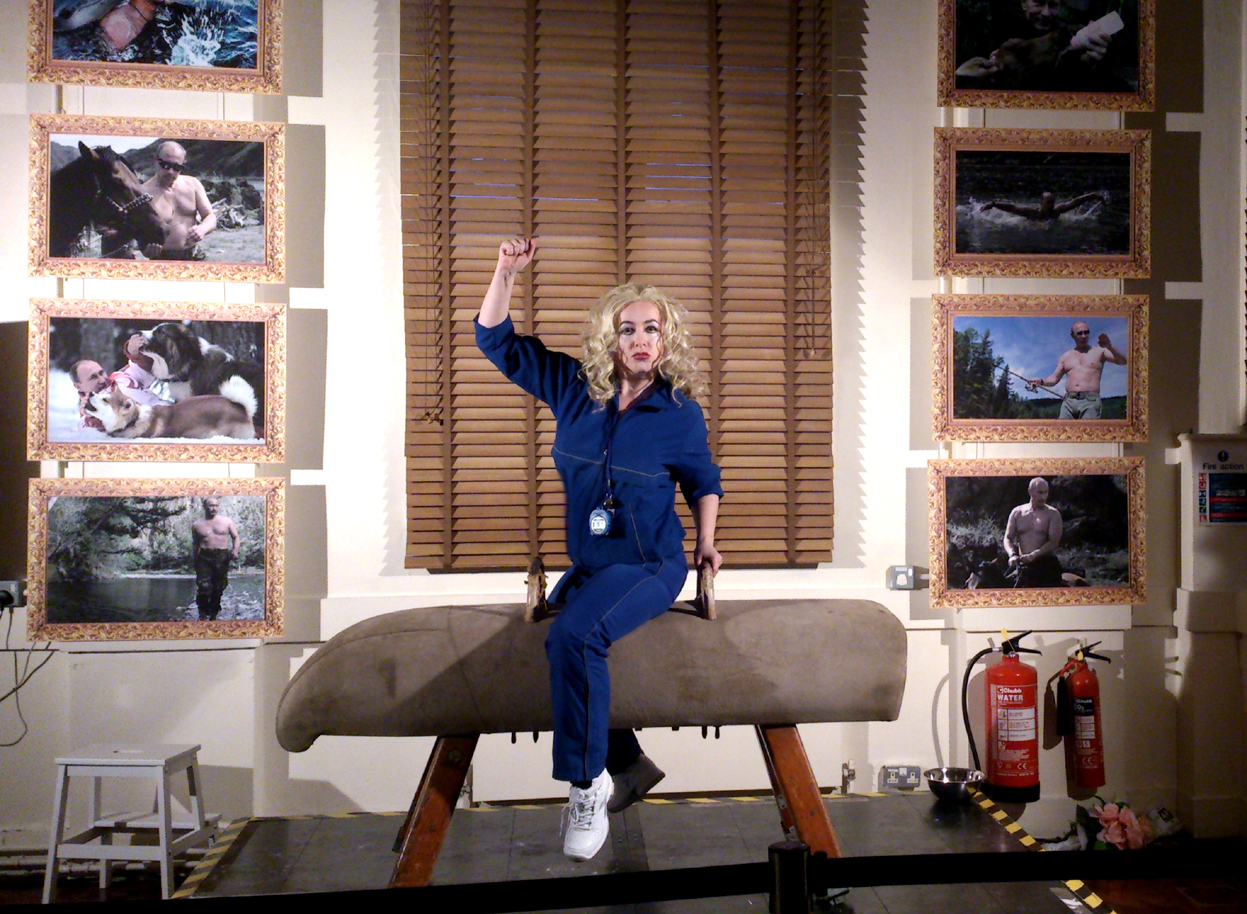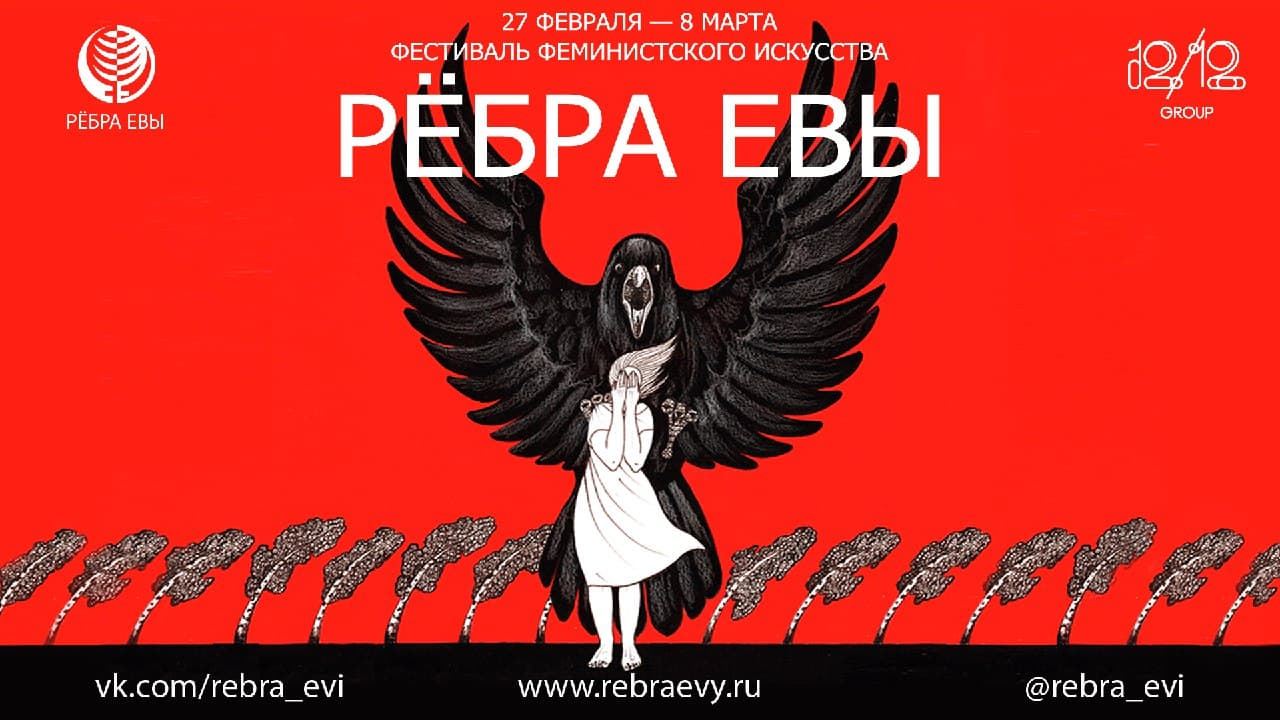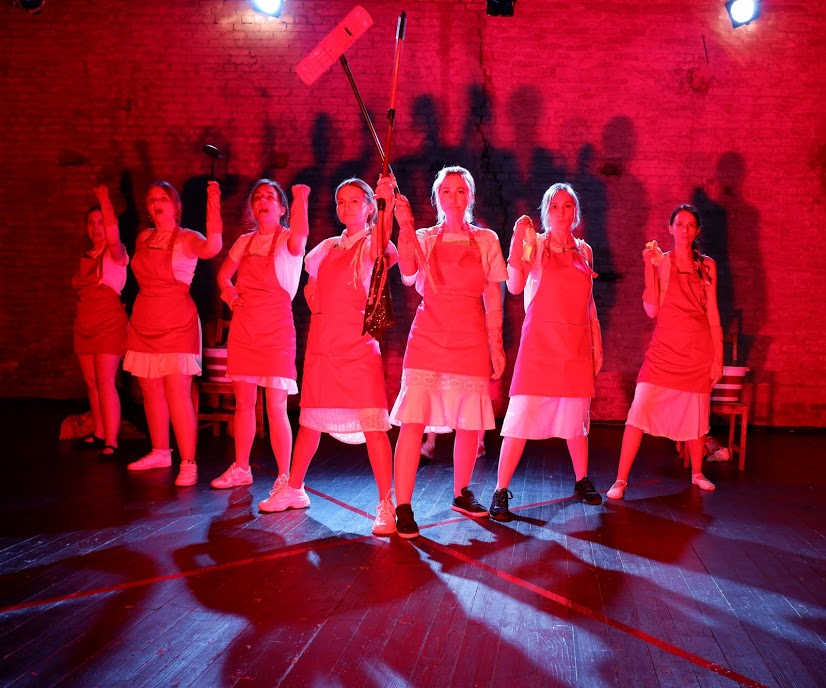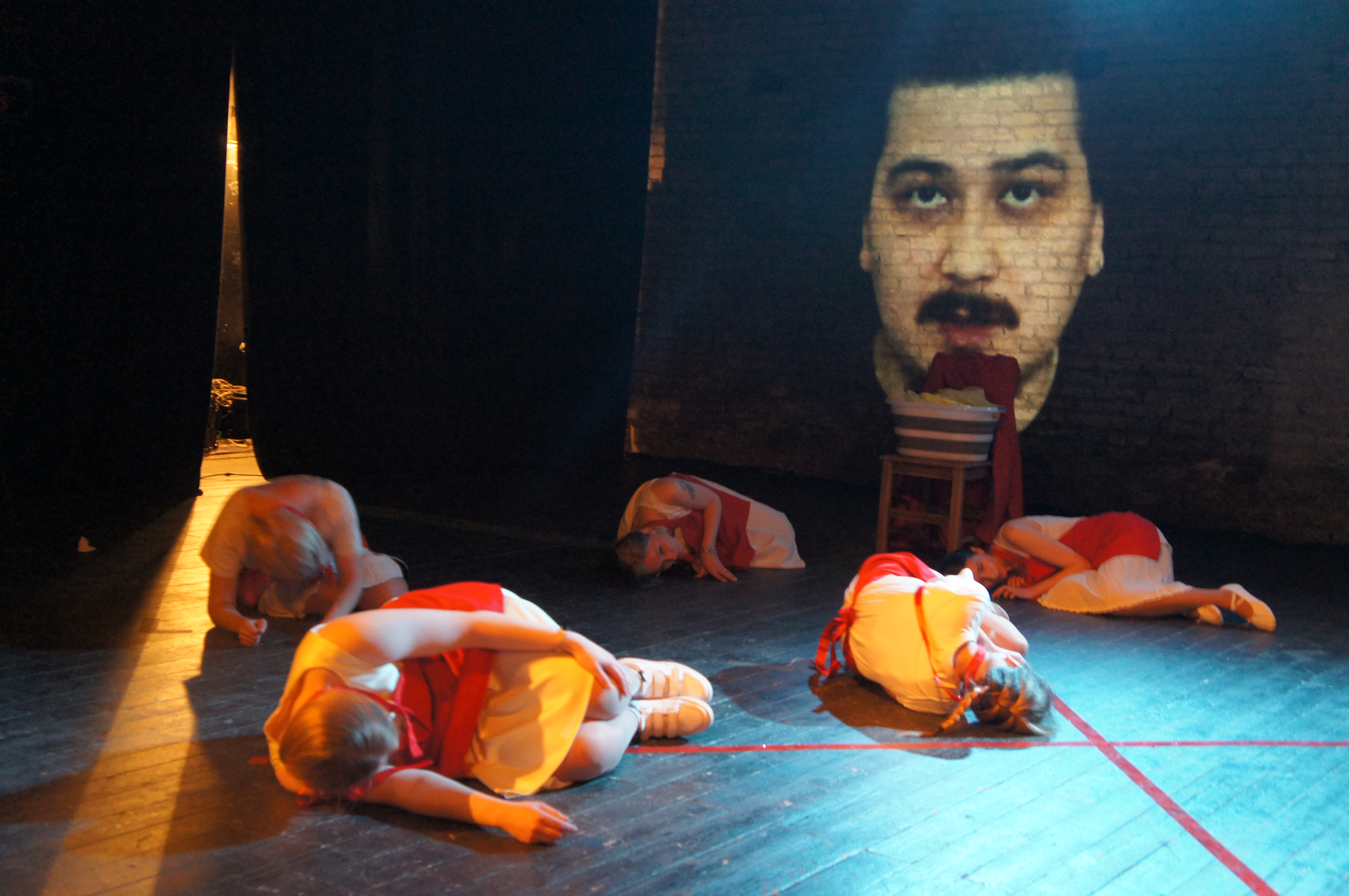1.2 Is there political art in modern Russia?
Out of the three aforementioned collectives, Voina, Pussy Riot, and Eve’s Ribs, the latter influenced me the most – to the point where I became one of its members. In this part of my thesis, I will give an overview of the impact of Eve’s Ribs’ work on the Russian art scene, my personal journey to joining the collective, and how being a part of it brought me to making what I now perceive as political art.
While working in England circa 2015-2016 and after finally coming to terms with my own stance in regards to efficiency of political art, I started making performances reflective of political situation in Russia. My first overtly feminist show Objectify Me was commissioned by Calm Down, Dear festival at Camden People’s Theatre in 2015, and my performance called Unicorns and Other Animals That Don’t Exist (a response to the Russian anti-gay propaganda law) was quite successful on the queer cabaret scene. However, I was still trying to find my footing and to understand my own motives in making those performances. The debate of efficiency of political theatre came back with vengeance. Who were my performances for? Why was I protesting in what I thought was the safest place on Earth? What was the point of being political in a place where the change was not needed anymore? I believe that the tipping point for me was when I got invited to collaborate with a famous British queer art collective Duckie. The group had a big following in London and was known for throwing most thought-after Pride parties. In 2015, international politics became the theme of their major Pride event called Border Force. They were planning an immersive experience, revolving around four countries most known for their oppression towards queer communities – China, Brazil, India, and Russia. Artistic director of the event Joshua Sofaer explained the choice of the topic in the following way: “We wanted to bring the politics back to Pride”, which he further defined as a desire to remind people in the UK that in more than 75 countries across the world homosexuality was still illegal, and people were being murdered for their sexual preferences (Hall 2015).
In Border Force, I played the role of ‘The Russian’ which in practice meant being a Master of Ceremonies for the Russian zone. Even after the show, my character’s name ‘The Russian’ got stuck with me. Some of my colleagues started taunting me by saying that my stage name, or even my actual name should be changed to ‘The Russian’ permanently, because in their view that was who I was on the scene at that period of time. The notion annoyed me at first, and later became a serious point of concern. Not just because everything I was doing was compressed into a single point of me being Russian but mostly because being ‘The Russian’ in any community, on any scene, however big or small, meant representation. So, what was I representing? Why was I representing anything? Did I have the right to?
Prompted by those thoughts and doubts, I started researching activist Russian scene more thoroughly. I found Eve’s Ribs and Coming Out – two of the organizations I would later come to work with. I read about protest art they were doing in Moscow and St-Petersburg, about arrests, threats and overall danger, and about their reasons to do what they were doing. The more I was reading, the more I was getting ashamed of myself. So, eventually, I came to the following agreement with myself: I will not produce anything that I consider to be political until it actually matters. At that point, everything I did was more or less political, so I stopped altogether. I promised myself that I would not resume being an artist in any shape or form until I am able to clearly answer why, where, and for who I am making art. I moved to China, became a teacher, and for three years completely forgot about art.
I met Leda Garina, one of the founders of Eve’s Ribs collective, in 2019, upon my return to St-Petersburg, at an event dedicated to the official release of the first book series Fairytales for Girls, which she curated at that time. Eve’s Ribs is a Russian feminist art collective with a strong focus on anti-militarism and the defense of human rights. One of the main goals of the collective is to change public opinion by showing that discrimination against women is a key problem which affects everyone (collective's manifesto on the official website). Eve’s Ribs does this using all means available: by making films, writing texts, organizing demonstrations and performances, drawing comics, giving lectures, running festivals, doing research, creating space for socializing and exchanging experience and much more. It was founded by several artists from Russia and Finland in 2016, and was initially a Russian-Finnish festival project, supported by Kone Foundation. Later, the collective opened its own women-only coworking space in St-Petersburg, and branched out onto many other activities apart from the original festival. Since the beginning of Russian invasion of Ukraine in 2022, Eve’s Ribs does no longer physically exist in Russia, however, its members continue their activist work abroad.
Leda Garina has always been responsible for the artistic side and programming of various events under the umbrella of Eve’s Ribs. With her knowledge as a theatre director and performance artist, she made numerous protest performances all over Russia. For years, in Russian press, she has been the face of country’s feminist movement. Some of Garina’s and Eve’s Ribs’ performances include: Give Birth To Meat (2019)– a Military Day performance in front of military enlistment office, protesting against abortion prohibition and conscription; Vulva Ballet (2019) – performance in front of Mariinsky theatre of opera and ballet in support of Julia Cvetkova, who was arrested for posting feminist-themed pictures on social media; Crossing the River in Coffins and She-wolf Mother Russia (2020) anti-military performances against army forces; Kremlin Take-Over where seven feminist and anti-government posters were put in various places in Red Square and Kremlin in Moscow (2020), and various street processions throughout the years. Eve’s Ribs did what Pussy Riot perhaps would have done if their activity in Russia was not stalled after their first big performance. Eve’s Ribs would perhaps have been just as famous, if any of the members ever received prison sentences of the same length.
After meeting Garina, I soon realized that our views on protest art were very similar: she believed that in order to successfully convey a political message, art “needed to be funny, controversial, sexualized”. This is a quote from an interview she gave in 2019, where she also stated that as activists “we can’t just complain. We can always complain about domestic abuse and sexual abuse, but I think that if we don’t show that we can be aggressive, none of our complaints will be heard” (Ekmanis 2019). Seeing these similarities in artistic and political views, I immediately decided to join the collective, and, subsequently, became responsible for yearly Eve’s Ribs festival organization, international collaborations, and Fairytales for Girls book project. My questions of why, where, and for whom I was working were definitively answered when I was introduced to many groups supported by Eve’s Ribs (psychologically, legally, artistically) – survivors of domestic abuse, child abuse, prostitution, violence, and discrimination. It was not an aesthetical choice for me anymore – to make art involving problematic subjects or political statements – it was a necessity, if not for me personally, then for women who desperately needed to be seen because that was the only form of justice they were going to get. I was not thinking whether an art festival or a protest performance could make a political change in the country, I was no longer considering debates on protest art efficiency, I just knew that any public act, any performance, would make a change for those specific women who in a lot of cases had nothing to lose anymore. Being a member of Eve’s Ribs shifted my focus from my own artistic ego to trying to facilitate those who needed to be heard.
In 2021, I directed a stage version of 28 Days play by Olga Shilyaeva for Eve’s Ribs festival. It was my official return to theatre after years of abstinence because for the first time I fully allowed myself to create something that I considered political. But why? And what did ‘political’ mean to me at that moment? The play is a ‘tragedy of a menstrual cycle’ as the author defined it herself. It is a fitting description since the form of the play is precisely the form of an ancient Greek tragedy, and the characters in the play are ‘A Woman’ and ‘A Chorus of Women’. It is essentially a woman’s monthly journey from menstruation to menstruation, but under this premise lies a much deeper discussion of what it means to be a woman in contemporary Russia. There is ‘A Chorus of Men’ in the play as well, spewing cliché phrases like “women should be seen, but not heard”, or “during menstruation women should be isolated from society since it is disgusting”, or “a woman is not a person”. When I first read the play, everything that ‘A Chorus of Men’ was saying felt exaggerated to me, I thought it was there for some sort of comedic relief, a sarcastic commentary on our usual stereotypes. However, I was very soon proven to be wrong. My directorial decision was to include ‘A Chorus of Men’ as a video projection, so only women on stage would have live presence. I recorded over 30 men individually, some via an open call, some I literally found on the street. Each of them just had to read a few lines from the play in front of a camera. I never asked them to comment on anything they were reading, to agree or disagree with it. However, the majority were very much pleased with their lines saying that someone finally wrote what they were thinking – they genuinely thought that this is what the play was about. This filming process was another nudge for me to step out of my safe bubble of equal rights and mutual respect into actual modern Russian reality that in my view desperately needed political art.
I made 28 Days production with a cast of women who had no relation to professional theatre – they were all activists from feminist communities and had very diverse professional and personal backgrounds. The production received good reviews, from both audiences and critics, opened a lot of interesting discussions, and was an overall success, however, the thing I remember the most was the necessity to have ‘damage control’ personnel during every performance. With everything we have organized as Eve’s Ribs, including this production, we constantly had to be aware of possible police interventions, arrests, and persecution from various ultra-right and neo-nationalist organizations (reports on those interventions can be found in variety of Russian media, including Fontanka.ru and Mediazona). We had our fixed rituals before every performance – people on lookouts, people who would coordinate the fastest escape for performers in case of an intervention, lawyers’ numbers in phone books. I remember constantly trying to prepare myself for a police interrogation. That was my reality as an artist, and that was the only way I would allow myself to make political art, since everything I did would automatically become political anyway just by association with who I was and what I stood for.
Going back to the question I raised in this chapter - what did ‘political’ mean to me and why I allowed myself to do it? - I think it was the matter of concrete reasons, goals, and consequences; knowing who I did it for (behind my every artistic decision at that time stood actual real women with their stories of abuse, grief, and injustice) and the element of danger which made me feel like it was serious, it was ‘of consequence’ because people in power did not want to be confronted with what we were doing. There was risk. At that time, I thought that I could only call myself political if I was risking something and that it was for someone’s sake.






